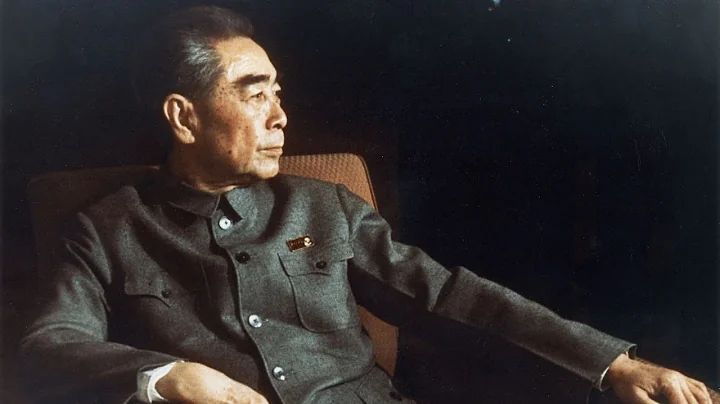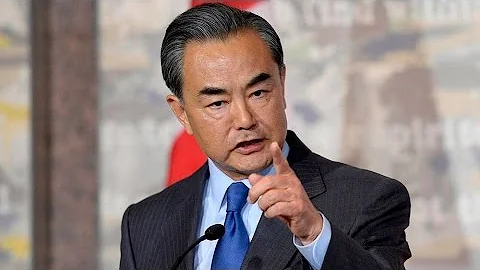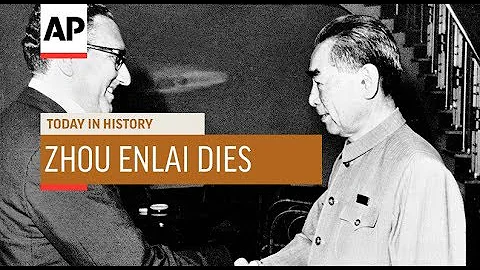On January 1, 1976, Premier Zhou Enlai, who was in critical condition, had entered the dying stage. Early that morning, while half asleep, the Prime Minister vaguely heard the sound of a radio broadcast. It turned out that it was broadcasting the New Year's Day editorial for the new year.
Not long after, Premier Zhou learned that two poems by Chairman Mao had been published today. Although was suffering from illness, he always cared about the people of the country and asked the staff to read it to him.

Zhou Enlai
Zhao Wei, who had worked beside Zhou Enlai for many years, quickly read it to the Prime Minister. Suddenly, when Zhou Enlai heard a sentence from one of the poems, the corner of his mouth twitched a few times, a smile appeared on his face, and he even let out a faint laugh...
Rili Manji became sick from overwork
October 1949 New China After its establishment, Zhou Enlai, as the Prime Minister of the country, had to face various matters, large and small, every day. He has always been hands-on in everything, and often works all night long, so he has everything on his plate.
As a wife, Deng Yingchao was very worried when she saw her husband working so hard. She often reminded Zhou Enlai to pay attention to his health, but the Prime Minister was often unmoved and often refused to rest until early in the morning.
Later, Deng Yingchao came up with a plan: at five or six o'clock in the morning, she woke up her niece Zhou Bingyi, who lived in , Xihua Hall, , and asked her to go to Zhou Enlai's office, pull her uncle's clothes, and ask him to talk to him. Go to the park to see the flowers together.
It turns out that Zhou Enlai's office generally did not allow others to enter casually; but because Zhou Bingyi was still very young at the time, he cleverly circumvented this restriction. Not only that, but the prime minister couldn't refuse his niece's request, so he had to follow her out. As soon as he went out, Zhou Enlai found that the car and the guards were ready. He also understood instantly: These are all the good intentions of his wife!
After working so hard for more than ten years, In February 1967, Zhou Enlai was diagnosed with heart disease. During that time, Premier Zhou was particularly busy. Representatives of various mass organizations, military leaders and local leaders from Beijing and across the country were frequently interviewed by him.
In May 1967, Zhou Enlai's niece Zhou Bingde, who was working in Xi'an, came to Beijing on a business trip and went to Xihua Hall to visit her uncle and aunt. When she stood at the door of Premier Zhou's office and accidentally looked inside, she couldn't help but be surprised: there were stacks of documents everywhere on the desk, on the recliner, and even on the floor. During that time, documents and questions from all over the country poured into Xihua Hall.

Zhou Enlai
As a result, Zhou Enlai had less and less sleep time, and working sixteen or seventeen hours a day became commonplace.
When Zhou Bingde saw his uncle this time, he clearly felt that his face had become much thinner and his eyes were bloodshot. Even when eating, Zhou Enlai would put down his chopsticks after a few chops and hurried to the office.
On the door of his uncle's office, Zhou Bingde also found a large-character poster, the content of which was a request for Premier Zhou to pay attention to rest, take care of his body, and change his working style and living habits .
Zhou Bingde took a closer look and found that there were signatures of Chen Yi, Ye Jianying, Li Xiannian and others on this big-character poster. It turns out that this was written by the staff around Premier Zhou. After Deng Yingchao saw it, he added a few suggestions.
Zhou Enlai himself wrote eight characters on it: "Sincere acceptance depends on practice" . But after Zhou Bingde heard from his aunt that his uncle still rarely rested, he wrote two lines of small characters next to his uncle's eight big characters: "Your practice is not enough, you must really practice."
September 1967 One day, Zhou Enlai said to Deng Yingchao: "As soon as it's about eight o'clock in the morning, I lose my energy and my hands are shaking." Since his heart was abnormal, he began to need oxygen regularly. When working, there will be doctors and nurses standing guard outside. If a serious situation occurs, they can provide rescue at any time.
By 1968, as the staff around him were transferred one after another, Zhou Enlai only had two secretaries left: the old secretary Qian Jiadong, and the newly transferred Ji Dong.
There are fewer secretaries, and the burden on Premier Zhou's shoulders is correspondingly heavier. When talking with a visiting Albanian guest, Zhou Enlai said: "I only have two secretaries now. Twenty-four hours a day, one person has to work twelve hours, and I have to let them rest. I let them go at night. , I write and do some things by myself. "

Zhou Enlai
Faced with a large number of complex and difficult tasks and his deteriorating health, Premier Zhou did not slack off at all, but continued to work hard with enthusiasm. When meeting Japanese guests once, he said this: "In the long years of China's revolutionary war, many comrades have sacrificed their lives. In order to shoulder the work of the sacrificed comrades, we living people must work even harder. I work hard every day Motivating myself with this can be regarded as my "way to maintain health."
Suffering from cancer Keep working
As the days passed, Premier Zhou continued to work hard day after day. And the disease in his body was growing day by day.
In September 1972, 74-year-old Zhou Enlai suffered from angina pectoris twice, one of which was accompanied by premature beating. At the same time, his pulse also showed a larger pulse pressure difference and faster beating.
After completing the electrocardiogram, the doctor discovered that the insufficient blood supply of Premier Zhou's pulse arteries was worse than before. This is not a good sign.
On November 11 of the same year, Zhongnanhai Clinic organized a number of cardiologists for consultation. Everyone came to a unanimous conclusion: Premier Zhou's heart disease is developing seriously and requires prompt attention.
At the same time, the terrible cancer is also attacking the Chinese leader.
Starting from June 1971, occult blood often appeared in Zhou Enlai's stool. On May 19, 1972, Zhou Enlai's health doctor Zhang Zuoliang called Bian Zhiqiang, director of the Zhongnanhai Clinic, and told him that the Prime Minister red blood cells were found in his urine. He asked the head of the medical team Wu Jieping to ask several doctors to study it.
html On May 25, after the research and judgment of several doctors, highly suspicious cancer cells were found in Premier Zhou’s urine samples. In the following days, experts from Beijing, Tianjin and Shanghai conducted consultations and reached a unanimous opinion: "There is a high possibility of urinary tract tumors bladder cancer " .At that time, according to the instructions of the central government, this condition was kept secret from Zhou Enlai. However, the attentive Premier Zhou still noticed something strange in his urine. He had inquired with the doctor, but the doctor did not tell him the test results in accordance with disciplinary requirements. From then on, Zhou Enlai began to test urine every day to observe his condition.
On January 5, 1973, Premier Zhou had a large amount of blood in his stool. On February 5, another incident of gross hematuria occurred. In March, due to frequent gross hematuria, tissue masses appeared.
At this time, the illness could no longer be concealed from Zhou Enlai himself. After reporting to Chairman Mao, on the evening of March 2, Ye Jianying and others informed Zhou Enlai and Deng Yingchao of the relevant situation: "There were suspicions before, and they were highly suspicious after February 5. When the organizational block appeared on March 1, it was confirmed that there were some problems. ”

After Zhou Enlai
learned of his illness, and after completing the reception of Kissinger’s visit to China, Zhou Enlai asked for leave from the Political Bureau of the Central Committee for treatment and reported to Chairman Mao. After reading it, Chairman Mao wrote "agree" on the leave request report.
In this way, accompanied by Deng Yingchao, Zhou Enlai went to Yuquan Mountain from March 10 to 24 for a comprehensive examination and treatment. After that, his condition was under control.
Seeing that his situation had improved, Premier Zhou immediately threw himself into the intense work . From domestic affairs to foreign affairs, he is busy.
In October 1973, Zhou Enlai, who felt that his health was recovering well, accompanied Canadian Prime Minister Trudeau and his delegation to visit Luoyang, Henan Province.
When leaving there with the foreign guests, faced with the "Welcome Prime Minister to come to Luoyang again" from the local comrades, Zhou Enlai, who was in good spirits, replied loudly: "I will come to Luoyang to see the peonies on May Day next year!" After arriving in Beijing, doctors continued to conduct strict tests on Premier Zhou's urine. Since observing urine color can most directly determine the condition, Dr. Zhang Zuoliang will follow the Prime Minister and remind him to relieve himself every two or three hours.
One day at the end of October this year, Zhou Enlai was talking to others in the Fujian Hall of the Great Hall of the People. Dr. Zhang saw that the Prime Minister had not urinated for several hours, so he decided to go in and urge him.
After seeing Zhang Zuoliang come in, Zhou Enlai immediately understood the other party's intention. So, before Dr. Zhang could speak, he took the initiative to go to the bathroom.
After returning from the bathroom, Premier Zhou glanced at Zhang Zuoliang and said nothing. But it was this glance that gave Dr. Zhang an ominous premonition: Why did the Prime Minister's eyes look so weird...
Zhang Zuoliang immediately rushed to the bathroom and saw blood in his urine... At that moment, Dr. Zhang's mind went "bang" "With a sound, I felt that everything around me was spinning...

Deng Yingchao and Zhang Zuoliang
Under such circumstances, Premier Zhou, who cared about the country and the people, still continued to work. It was not until March 1974 that he went to the 305 Hospital for a comprehensive examination and was diagnosed with cancer recurrence .
Subsequently, the relentless disease continued to attack the 76-year-old man. Starting on April 25, he continued to bleed in large amounts, sometimes with blood clots, and was unable to urinate for 10 consecutive minutes.
Under such serious circumstances, Zhou Enlai was admitted to the 305 Hospital on June 1. After that, he never returned to Xihua Hall.
Faced with the painful torture of the disease, this time-tested revolutionary has always shown strength. He wanted to know the true condition of his body and once said to Zhang Zuoliang: "Doctor Zhang, if you tell me the situation, it will be easier for me to make my own decision!" To other medical staff, Zhou Enlai also said: "You must understand my condition , Tell me truthfully at any time. Because there is still a lot of work to do, I have to give an explanation.”
After being admitted to the hospital, although many duties were handled by Deng Xiaoping, Zhou Enlai still did not give up his work.. He seized every minute and second to hold various conversations and meetings.
Not only that, Premier Zhou was still concerned about the safety of the people while he was on the hospital bed. When he saw a letter from people in a mountainous area in Shanxi who said salt was a penny more expensive than in the city, he immediately instructed: "No matter what, we must find a way to solve this problem and make sure the people in the mountainous area have access to salt." A strong earthquake occurred in the Haicheng area. He instructed the State Council to issue a notice to praise the relevant units that issued the earthquake forecast, and proposed to send a delegation to the disaster area to express condolences to the affected people and encourage them to be self-reliant and rebuild their homes.
On January 13, 1975, the Fourth National People's Congress was held in Beijing. Zhou Enlai appeared on the rostrum amid thunderous applause from the crowd. Although his figure was thin, his aura was still so resolute.

Zhou Enlai
Zhou Enlai, dragging his body with him, made the "Government Work Report" on behalf of the State Council. During the meeting, he also participated in discussions with the Tianjin delegation.
Premier Zhou told the Tianjin delegates: "I have cancer, and there is not much time left. But I will work hard to fight the disease, gain more time, and fight with everyone."
After listening to the Prime Minister's words , many people at the scene couldn't help but shed tears...
He smiled while listening to Chairman Mao's poems while he was dying.
Although the medical staff gave full treatment, Zhou Enlai's condition still did not improve. After December 1975, he entered an intermittent coma.
Late at night on December 7, Premier Zhou suddenly fell into a coma and could not wake up no matter how he called. The doctor on duty hurriedly called all the experts and medical staff.
After examination, it was found that Zhou Enlai had thick phlegm in his trachea, which blocked his respiratory tract, causing lack of oxygen to the brain and causing him to coma. After sucking out the phlegm, Premier Zhou woke up quickly.
After opening his eyes, Zhou Enlai saw the central leadership comrades who came to him after hearing the news, with a smile on his face. He stretched out his hand tremblingly and shook hands with everyone.
After mid-December, Zhou Enlai's body pain increased day by day, and even painkilling injections became ineffective. But even so, the strong Premier Zhou still gritted his teeth and did not scream.
Only once, when he could no longer stand the severe pain, the Prime Minister called Zhang Zuoliang to his side and said painfully to him: "Doctor Zhang, I really can't help the pain. I want to hum, can you?"
Listened At this, Zhang Zuoliang said quickly: "Prime Minister, if you feel pain, just scream, it doesn't matter! Prime Minister, please stop restraining yourself."
As he spoke, tears overflowed from Zhang Zuoliang's eyes. Even in the face of such great pain, Premier Zhou is still unwilling to influence others. What kind of tenacity and broad mind is this!

Zhou Enlai
In the last moments of his life, Zhou Enlai was still very concerned about the situation at home and abroad. Since he could no longer sit up, he asked the staff around him to read documents and newspapers to him.
Early on the morning of New Year's Day in 1976, while half asleep, Zhou Enlai heard the sound of the radio. Soon after, he learned that two of Chairman Mao's poems had just been published today.
These two poems, one is " Water Melody Songtou·Revisit Jinggangshan ", the other is " Nian Nujiao·Bird Questions and Answers ". In fact, these two works were written by Chairman Mao in 1965, but they were not published before.
In the afternoon of that day, as usual, when Premier Zhou was awake, everyone asked if they wanted to read him the important news in the " People's Daily ".
Zhou Enlai asked Zhao Wei to read to him the " Bird Questions and Answers " that Chairman Mao had just published today. Zhao Wei then read out:
" Kunpeng spreads its wings, ninety thousand miles away, flipping the fuyao horns.
Carrying the blue sky on its back, looking down, it is a human city.
The sky is full of artillery fire, and bullet marks are everywhere, scaring the birds in the room.
How can it be done? , Oh, I want to make a leap.
I asked you where you are going, Que'er replied: I didn't see Qiu Yuelang the year before last.
There is still food. The potatoes are cooked.
No. You must fart! See the world turn upside down."
When Zhao Wei read the last sentence "No need to fart! See the world turn upside down", Zhou Enlai's mouth twitched a few times, a smile appeared on his face, and he even laughed faintly. . Obviously, he was amused by Chairman Mao's popular and straightforward words...
However, the bone-chilling pain struck him quickly and mercilessly. Premier Zhou pursed his lips and his forehead was covered with sweat. Despite this, he still motioned to the staff to put the newspaper next to his pillow.
Later, Zhou Enlai asked the staff to read the poem to him several times. Every time he listened, he seemed to be temporarily free from his illness. Scenes of past events between myself and Chairman Mao over the past decades came to mind from the memories...

Zhou Enlai and Chairman Mao





















